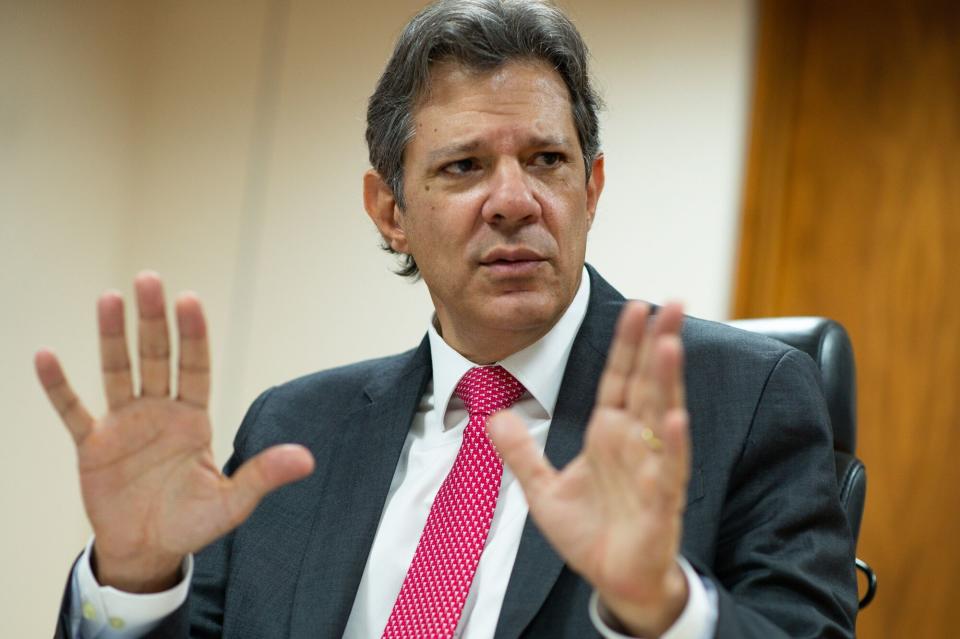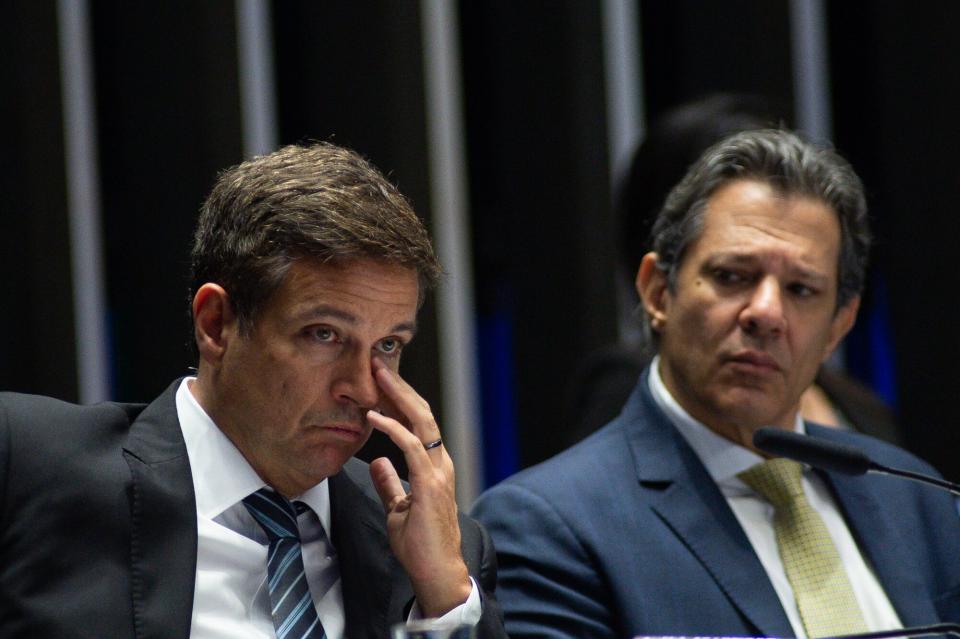Brazil Finance Chief’s Closest Allies Are His Fiscal Plan’s Biggest Critics
(Bloomberg) -- They have accused him of making “a deal with the devil.” They have slammed him for prioritizing smaller budget deficits over social spending. They fear he is alienating his party and its working class base as he seeks favor with investors.
Most Read from Bloomberg
Nigeria Targeted a UK Mansion; Its Next Leader’s Son Now Owns It
Carl Icahn’s Wealth Plunges $10 Billion on Hindenburg Short-Seller Report
Wall Street Rattled by 15% Tumble in Pair of Banks: Markets Wrap
US Gives a ‘Free Pass’ to India as Worry Over China Rivalry Deepens
Four months into his tenure as Brazil’s finance minister, Fernando Haddad’s fiercest critics are no longer the market interests that once expressed reservations about his ascension to the position overseeing Latin America’s largest economy. Instead, they are his ostensible allies in the leftist Workers’ Party, some of whom have come to see his plan to overhaul the country’s fiscal rules as merely another barrier to President Luiz Inacio Lula da Silva’s efforts to kick start the economy and expand social welfare programs.
The fiscal plan the government sent to congress in April is a window into the difficulties Haddad faces in what may be Brazil’s most politically-fraught position, a job that requires him to walk a tightrope between investors and the various factions that make up Lula’s party and his government. The proposed legislation would replace the country’s so-called spending cap rule while seeking to shore up its public finances and set the stage for Lula to pursue his broader economic agenda. Each side has welcomed parts of it, and found faults with others.
Read More: Lula Delivers Plan to Rein In Debt Amid Revenue Uncertainty
But it was the intensifying scrutiny from Haddad’s left that caused Lula to come to his finance minister’s defense last month, as he blessed the plan. “Sometimes I know you hear some criticism,” the president said. “I have to praise you and the team because when it comes to the economy, when it comes to tax policy, we’ll never have 100% solidarity.”
Haddad, meanwhile, says he is taking the same approach to see-sawing relations with both markets and his own party that he had in previous jobs as Brazil’s education minister and Sao Paulo’s mayor.
“I sit down to work. I sit at the table with everyone else and work,” he said during an April 4 interview in his cabinet office in Brasilia. “I have a characteristic that is: I like to talk, to learn, to listen. I don’t feel uncomfortable looking for answers. I like to formulate from the impressions I receive.”
Ally or ‘aristocrat’?
After the 2022 election, investors expected Lula to pick a market-friendly name for the most important cabinet position in his government, especially after he chose Geraldo Alckmin, a former rival from the center-right, as his running mate.
The president instead handed it to his close confidant and potential heir. Haddad began his career as an investment analyst and holds a master’s degree in economics, but the selection of a leftist politician with little experience in major federal budgetary negotiations alarmed markets. The reaction surprised Haddad, who said he had maintained a cooperative relationship with Sao Paulo’s financial sector during his time in charge of the city.
Since then, however, he has reached out to investors to show that he will seek budget balance and fiscal responsibility, even as Lula has ramped up his criticism of them and pledged to boost spending to combat rising rates of poverty and hunger.
Haddad is far from the minister of the markets’ dreams. But his technocratic approach to the job and willingness to go against the government’s political team — like his successful battle to end fuel tax cuts and raise revenues — has convinced many investors that he’s the best available option inside this administration, said one economist who requested anonymity to speak frankly about the matter.
The markets want him to succeed, in part out of concerns that his failure would lead to a replacement from further to his left, another economist said.
The fiscal proposal, which aims to eliminate Brazil’s primary budget deficit by next year and deliver growing surpluses through the end of Lula’s term, has bolstered his reputation with markets, which initially welcomed the plan when Haddad unveiled it in late March.
Read More: Brazil Could Boost Revenue by $59 Billion Without Raising Taxes
After its release, Brazil joined a swath of developing nations in selling dollar bonds, its first test of global debt markets since 2021. It priced $2.25 billion in bonds due 2033. The strong demand, which reached as much as $8.5 billion in initial talks, led the government to bump up the sale from an original plan of $1.5 billion. Foreign investors also pared wagers against the Brazilian real after the government released the plan.
The framework also creates more space for potential investment into the economy than the spending cap allowed, Haddad has argued. But lawmakers like Lindbergh Farias, the congressman who called the plan a pact with the devil in an interview with Brazil’s Folha de S.Paulo newspaper, have said it doesn’t do enough to prioritize growth amid gloomy economic forecasts.
While the proposal has contributed to skepticism of Haddad on the left, it is not the only thing driving it.
Haddad has always cut something of an awkward figure within the Workers’ Party: His professorial disposition — he holds a Ph.D in philosophy — sets him apart from a movement that is still stylistically defined by its roots in working class opposition to Brazil’s political and economic elite.
The administration’s battle with Brazil’s central bank has put those differences on display. Haddad has joined Lula’s criticism of the monetary authority’s decision to maintain high interest rates. But he has done so in considerably milder terms than allies like Gleisi Hoffmann, the party leader who has said that markets want “interest rates in the stratosphere and a suicidal fiscal squeeze.”
The dynamics of that larger fight had already helped fuel the perception, at least in some corners, that the minister was aligning himself with financial interests and against ordinary Brazilians. Even before the fiscal plan’s release, some within the Workers’ Party had begun to refer to Haddad as “an aristocrat,” according to one government official who requested anonymity to discuss internal matters.
‘I won’t give up’
Haddad says he is happy and where he wants to be — and confident that he has the backing of his most important constituent. Haddad’s loyalty to Lula after the leftist leader was imprisoned on a corruption conviction strengthened their relationship, and led to Haddad serving as the party’s candidate in the 2018 presidential election when Lula was barred from the race.
“When the president said he was thinking about me for Finance Minister, I felt a strong impulse to accept,” Haddad said. “I believe that if Lula had won in 2018, he would have invited me to that position. He had already said that to me.”
And for all the criticism he has received, Haddad is on the cusp of his first major victory. Congressional leaders have said the fiscal proposal is likely to pass, although potential pitfalls remain and no one is fully happy with it.
Read More: 5 Key Issues to Watch as Lula’s Fiscal Overhaul Goes to Congress
Workers’ Party leaders in congress recognize the importance of the plan as a signal to markets, but some within it still want to seek changes during the legislative process. Last minute alterations to the bill before it was introduced, meanwhile, reignited some market fears about the government’s projections.
The framework “manages to be both worse than necessary and better than expected,” Verde Asset Management wrote in a letter to investors. It “will lead to complicated discussions in congress, at the same time that an administration that already spends a lot wants to spend even more.”
Its approval would mark only the beginning of Lula’s efforts to revive Brazil’s economy and deliver on his campaign promises, a fight that will keep Haddad in the spotlight. His approach, he said, is to continue listening to everyone: the various camps within his party, the unions and movements that make up its base, Brazil’s bank presidents and its business groups.
“I won’t give up,” he said. “I think that’s what enriches the work. I think it’s a healthy practice.”
--With assistance from Walter Brandimarte.
Most Read from Bloomberg Businessweek
Europe’s ‘Golden Visa’ Programs Are Dying Out as Housing Costs Rise
Women Chief US Economists Have Gotten Even Rarer on Wall Street
More Companies Head to Space, But No One Can Agree on the Rules Up There
©2023 Bloomberg L.P.

 Yahoo News
Yahoo News 



